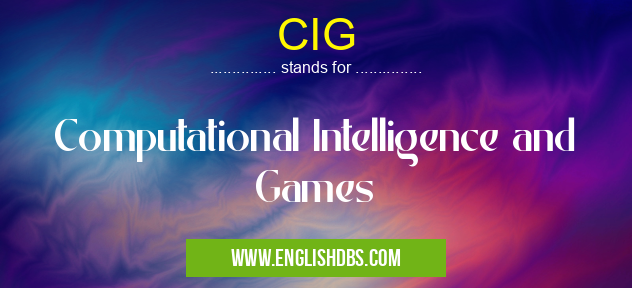What does CIG mean in COMPUTING
Computational Intelligence and Games (CIG) is a term used to describe the combination of artificial intelligence and game technology. It involves the application of AI algorithms in the development of games, from simple board game designs to complex virtual worlds. CIG has many applications in genres such as puzzle games, strategy simulations, and shooter games. This interdisciplinary field combines elements from both computer science and game design. The purpose of CIG is to create games that are more immersive, intelligent, and challenging.

CIG meaning in Computing in Computing
CIG mostly used in an acronym Computing in Category Computing that means Computational Intelligence and Games
Shorthand: CIG,
Full Form: Computational Intelligence and Games
For more information of "Computational Intelligence and Games", see the section below.
Essential Questions and Answers on Computational Intelligence and Games in "COMPUTING»COMPUTING"
What is CIG?
Computational Intelligence and Games (CIG) is an interdisciplinary field of research that intersects the areas of computer science, AI, and games. This field focuses on the development of advanced computational tools and techniques to create more interactive, immersive, and believable game experiences.
How does CIG apply to existing game development?
CIG provides a bridge between traditional computer graphics/animation and AI techniques in order to create more naturalistic game experiences. By combining these two disciplines, developers strive for more creative ways to make games even more exciting than before.
Why should I use CIG in my game?
By utilizing CIG tools and techniques, your games can become richer and more interactive with greater levels of depth. This also allows players to feel more immersed in their gaming experience as a result of features like advanced AI or real-time procedural generation.
What types of games has CIG been used in?
The application of CIG can be seen across a wide variety of game genres such as strategy games, tactical simulations, role-playing games, first person shooters, platformers/adventure titles, and many others. In addition to this flexibility in gaming applications, its usage can be further expanded beyond the video game industry towards other forms entertainment mediums like virtual reality experiences or interactive film production.
Is there any relation between AI and CIG?
Artificial intelligence (AI) is an important technology within Computational Intelligence and Games (CIG). AI algorithms are able to provide intelligent responses that can benefit gameplay by reacting realistically to player actions or creating unique challenges for each individual user – all providing for greater unpredictability within the gaming experience.
Are there any specific benefits from using CIG?
Some key advantages provided by utilizing CIG tools include increased immersion due to realistic behavior from NPCs or enemies; improved fidelity when responding to player input; better replay value through procedurally generated content; improved optimization when adjusting level design parameters; automated testing/balancing features; quicker iteration times through enhanced prototyping capabilities; as well as better storytelling professional through dynamically changing narrative systems.
What kind of technologies are used in a typical CIG system?
Common components found within a typical computational intelligence game system include machine learning algorithms; behavioral artificial intelligence models (e.g., fuzzy logic controllers); rule-based decision making systems which analyze data inputs from human controllers such as facial expressions or voice inflection; natural language processing solutions which interpret conversation threads between players or NPCs; procedural generation systems which generate new levels from scratch based upon design constraints set by developers.
Are there any risks associated with using CIG?
As with any technological solution utilized within modern day software design, proper evaluation must take place prior to deployment of any sophisticated computational systems into real world environments. Allowing unconstrained access can lead towards unpredictable results—which could potentially cause unforeseen issues related to safety or privacy concerns.
Are there any ethical considerations regarding the use of CI?
There are several ethical considerations related to the use of computational intelligence that may need careful review prior to implementation. These include potential bias due algorithmic behavior pattern recognition; protecting resources during training procedures—like power consumption for example—and ensuring transparent data management processes throughout computation tasks.
Final Words:
The use of Computational Intelligence and Games (CIG) has made it possible for developers to push the boundaries when creating immersive and challenging experiences for gamers across multiple genres such as puzzle games or strategy simulations. With CIG comes great potential for creating intelligent opponents that learn from player input as well as providing dynamic content that evolves with each new playthrough level or scenario played out by players during their gaming experience session.
CIG also stands for: |
|
| All stands for CIG |
